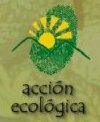Civil Society Organisations
 Acción Ecológica
Acción Ecológica
Quito, Ecuador
The work of Acción Ecológica focuses on the environmental impacts generated by activities such as oil extraction, mining, shrimp aquaculture, commercial forestry development, bio-technology, bio-prospecting and bio-piracy. It also deals with the urban environment, environmental impacts of globalisation, ecological debt and climate change.
Acción Ecológica is also a founding member of Oilwatch, established in 1995. Oilwatch is an international network that focuses on the negative impacts of oil and gas industry activity on peoples and their environments. Members support initiatives including monitoring of damages arising directly or indirectly from oil activity, and supporting local demands for compensation and restoration.
 A Sud – Ecologia E Cooperzione Onlus
A Sud – Ecologia E Cooperzione Onlus
Rome, Italy
A Sud is an independent, non-governmental, non-profit Italian association formed in 2003 with the aim of supporting indigenous movements of the global South in the pursuit of environmental justice and human rights. Through bottom-up international cooperation projects and thematic campaigns, A Sud operates both in the South and in the North: it supports participatory political processes for indigenous rights and their natural environments in the South, and it increases awareness in the North about the hidden costs of economic globalisation, unjust wealth distribution and associated social-environmental conflicts.
Besides organizing meetings and debates with intellectuals and activists from all over the world on topics such as ecological debt and common goods, A Sud is actively engaged in a theoretical reflection on the causes and solutions of current environmental conflicts through the gathering, documenting and cataloguing of materials about practical cases of socio-environmental conflicts in the South.
 Centre for Science and Environment
Centre for Science and Environment
New Delhi, India
The Centre for Science and Environment (CSE) is an independent, public interest organisation which aims to increase public awareness of science, technology, environment and development.
For more than two decades, CSE has been creating awareness about the environmental challenges that India faces, searching for solutions that people and communities can implement themselves, challenging India to confront its problems, inspiring it to take action, and pushing the government to create frameworks for people and communities to act on their own.
CSE is one of the most relevant CSOs in the environmental field in India, working on water harvesting policies, management of wildlife reserves, urban pollution, pesticides, and forest management. It publishes the journal Down to Earth every two weeks.
 Centre pour l’Environnement et le Développement, Friends of the Earth International
Centre pour l’Environnement et le Développement, Friends of the Earth International
Yaoundé, Cameroon
The Centre for Environment and Development (CED-FoEI) works on sustainability issues, capacity-building with communities and indigenous groups, organic farming and community forestry. CED-FoEI has a great deal of experience in the region participating for instance in the Forest platform in Cameroon, and in African Forest Law Enforcement and Governance processes in the Congo Basin.
CED joined FoEI in 1999, and takes part in the latter’s campaigns and programs on: climate change, desertification, ecological debt, forests, genetically modified organisms, international financial institutions, oil mining, gas, ozone, trade, environment and sustainability.
![]() Ecological Society Endemit
Ecological Society Endemit
Belgrade, Serbia
Ecological Society Endemit is a Serbian independent, non-profit, non-governmental organization, concerned with environmental conservation and protection of biodiversity, the introduction of sustainable development principles, public education and the promotion of environmental issues, energy efficiency, renewable energy sources, and ecology research projects. It was founded in March 2000 by students of Ecology and Environmental Protection at the Faculty of Biology, Belgrade University.
 Instituto Rede Brasiliera Agroflorestal
Instituto Rede Brasiliera Agroflorestal
Rio de Janeiro, Brazil
REBRAF is a Brazilian non-profit organization whose main objective is to promote sustainable, participatory and equitable rural development in Brazil using agro-forestry systems in deforested lands. REBRAF has pioneered agro-forestry development in Brazil and today almost all Brazilian rural development oriented CSOs promote agro-forestry as a land use alternative.
REBRAF’s leadership role in Brazil is essentially grounded in pragmatic agro-forestry courses carried out in most Brazilian states, publications (both scientific and those produced for grass roots training purposes), the implementation of rural development activities and projects and informative workshops and lectures given mainly in Brazil. REBRAF has obtained large-scale results with minimal infrastructure and a small team of experienced multi-disciplinary professionals.
 SUNCE, Association for Nature, Environment and Sustainable Development
SUNCE, Association for Nature, Environment and Sustainable Development
Split, Croatia
SUNCE is a non-profit organisation founded in 1998 in Split, Croatia. Through partnerships with other organizations and institutions, SUNCE is active on national and international levels. Its main goals are the conservation of nature and protection of the environment, and management of natural resources through implementation of sustainable development practices.
SUNCE acts through three main operational programmes: its Knowledge Centre runs activities and projects aimed at education and capacity building of CSOs; an Education and Awareness Raising programme targeting the general public and school children; and a Nature Conservation and Sustainable Usage of Natural Resources programme, involving biodiversity data collection, other research activities, workshops, and lobbying activities for the establishment and improved management of protected areas, waste, fisheries and agriculture.s
 Vlaams Overleg Duurzame Ontwikkeling
Vlaams Overleg Duurzame Ontwikkeling
Brussels, Belgium (Flanders)
VODO is an umbrella organisation of CSOs coming from the environmental, international cooperation, peace, women’s, youth, refugees and migrants and poor people’s movements. Its main goal is to promote and implement sustainable development on various levels (international, national and local) through research and policy work, and by developing tools for practical use in civil society work.

























